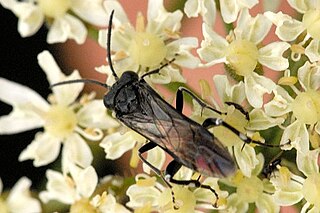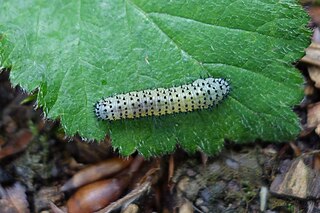
Sawflies are the insects of the suborder Symphyta within the order Hymenoptera alongside ants, bees and wasps. The common name comes from the saw-like appearance of the ovipositor, which the females use to cut into the plants where they lay their eggs. The name is associated especially with the Tenthredinoidea, by far the largest superfamily in the suborder, with about 7,000 known species; in the entire suborder, there are 8,000 described species in more than 800 genera. Symphyta is paraphyletic, consisting of several basal groups within the order Hymenoptera, each one rooted inside the previous group, ending with the Apocrita which are not sawflies.

The Orussidae or the parasitic wood wasps represent a small family of sawflies ("Symphyta"). Currently, about 85 extant and four fossil species are known. They take a key position in phylogenetic analyses of Hymenoptera, because they form the sister taxon of the megadiverse apocritan wasps, and the common ancestor of Orussidae + Apocrita invented parasitism for the first time in course of the evolution of the Hymenoptera. They are also the only sawflies with carnivorous larvae.

Cephoidea is a small superfamily within the Symphyta, commonly referred to as stem sawflies, containing some 100 species in 10 genera in the living family, Cephidae, plus another 17 genera in the extinct family Sepulcidae. Most species occur in the Northern Hemisphere, especially in Eurasia. The larvae are stem borers in various plants, especially grasses, but sometimes other herbaceous plants, shrubs, or trees. A few are pests of cereal grains. They are exceptionally slender for symphytans, often resembling other types of wasps, and they are the only Symphyta which lack cenchri. They are sometimes postulated to be the sister taxon to the Apocrita, though the Orussidae are more commonly considered such.

Tenthredinidae is the largest family of sawflies, with well over 7,500 species worldwide, divided into 430 genera. Larvae are herbivores and typically feed on the foliage of trees and shrubs, with occasional exceptions that are leaf miners, stem borers, or gall makers. The larvae of externally feeding species resemble small caterpillars. As with all hymenopterans, common sawflies undergo complete metamorphosis.

Nematinae is a subfamily of sawflies belonging to the family Tenthredinidae. It contains over 1250 described species in ~40 genera. Members of this subfamily feed on a wide range of plants and employ a wide range of feeding habits, both internally and externally, on their host plants.

Allantinae is a subfamily of sawflies in the family Tenthredinidae, and the largest subfamily of that family, with about 110 genera. The subfamily is considered to consist of five to six tribes, and are medium to large sawflies.

Tenthredo scrophulariae, the figwort sawfly is a species of the family Tenthredinidae, subfamily Tenthredininae.

Tenthredo temula is a sawfly species of the family Tenthredinidae, subfamily Tenthredininae.

Cephidae is a family of stem sawflies in the order Hymenoptera. There are about 27 genera and more than 160 described species in Cephidae.

Tenthredo colon is a sawfly species belonging to the family Tenthredinidae.

Monostegia is a genus of sawfly. The authority is based on the description by Achille Costa and Oronzio Costa, although earlier work grants this to Fabricius 1798., though the commonest species, M. abdominalis, bears the authority of Fabricius.

Tenthredininae are a subfamily of sawflies within the family Tenthredinidae, the largest sawfly family. It consists of about 50 genera, including the type genus Tenthredo. It also includes most of the larger and more colourful members of the family. Some authorities divide these into tribes. Distribution is Northern Hemisphere and holarctic.

Empriini is a tribe of sawflies in the family Tenthredinidae.

Eriocampa is a genus of common sawflies in the family Tenthredinidae. There are about ten described species in Eriocampa.

Phymatocerini is a tribe of common sawflies in the family Tenthredinidae. There are about 7 genera and 11 described species in Phymatocerini.

Monophadnoides rubi, the raspberry sawfly, is a species of common sawfly in the family Tenthredinidae.

Monophadnoides is a genus of common sawflies in the family Tenthredinidae. There are about eight described species in Monophadnoides.

Nematini is a tribe of common sawflies in the family Tenthredinidae. There are about 14 genera and at least 30 described species in Nematini.

Periclista is a genus of common sawflies in the family Tenthredinidae. There are at least 20 described species in Periclista.


















